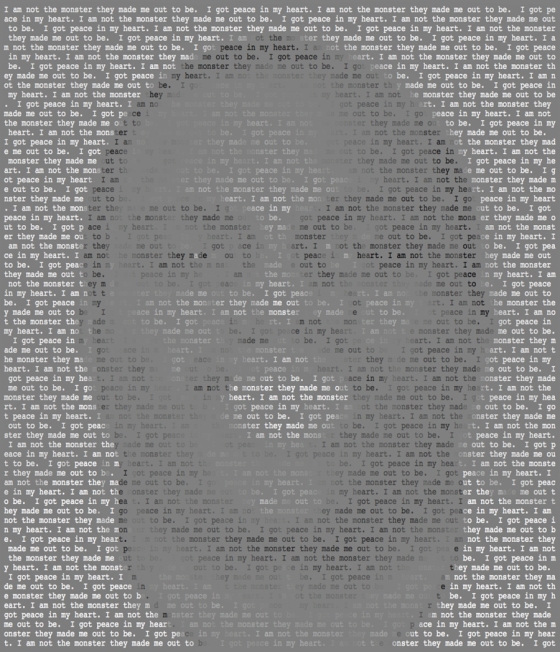
This image is part of photographer Amy Elkins’ project “Parting Words.” It portrays Franklin Alix, a man on Texas’ death row who was executed on March 30, 2010 at age 34.
Here at Root & Rebound, we could not be happier to see criminal justice reform and reentry issues making top national headlines. We feel it is important to share the writing and work of others in this field. Please check out some of the amazing things happening around our country—in art, politics, and journalism—all centered on fixing our broken criminal justice system and the barriers that face people coming out.
- Parting Words: The Visual Story of Death Row Prisoners’ Last Words, Pete Brooks for The Huffington Post (Feb. 6, 2014)
California-based photographer Amy Elkins has launched an incredible and haunting online visual archive of the more than 500 people on Texas’ death row who have been executed since the state’s death penalty was reinstated in 1976. These portraits overlap executed individuals’ mug shots with their last words as provided on the Texas Department of Criminal Justice’s Web page. On the Department’s “Executed Offenders” page, members of the public can scroll through the names, ages, prison IDs, race, convictions and last statements of the people in prison sent to death, in chronological order. At the time Elkins stumbled upon the website, it listed 440 men and women. Today, it lists 510.
Kristof’s op-ed in the New York Times this weeks describes how jails and prisons have become “de facto mental health hospitals,” calling this “inhumane” and “deluded.” Root & Rebound agrees. Many people struggling with mental illness and disorders have nowhere to go, can’t afford medicine outside of jail or prison, and are arrested and criminalized for behaviors and acts that often flow from their mental illness. When people facing mental health challenges are released, we do not have a social or legal system built up to support them; instead we funnel money back to incarceration instead of dealing with the problem from a fiscally and socially responsible services-based standpoint.
- Mercy in the Justice System, The Editorial Board of The New York Times (Feb. 9, 2014)
Last month, Root & Rebound shared the exciting news that the deputy attorney general, James Cole, of the Department of Justice, was searching for suitable candidates for clemency, specifically people with nonviolent, low-level drug offenses who are serving “life or near-life” sentences that are considered excessive under current law. (R&R has also written about excessive sentencing laws here and here.) In tandem with changes to federal drug sentencing laws, we applaud the Justice Department’s renewed interest in the President’s clemency powers, “designed so that the President could commute unjust sentences or pardon deserving petitioners who had served their time.” These signals from the federal government are important–there is new recognition that our system of incarceration in this country is seriously flawed and that mercy for people behind bars and people coming out of incarceration is a concept deserving of our country’s attention.
- Bill Keller, Former Editor of The Times, Is Leaving For News Nonprofit, Ravi Somaiya in the New York Times (Feb. 9, 2014)
At Root & Rebound, we are working hard to create useful information on reentry to be shared with the public, with practitioners and advocates, and with people living behind bars. So to learn that the incredible talent of Bill Keller, a columnist at The New York Times and its former executive editor, is building and directing The Marshall Project, a nonprofit startup journalism and news source dedicated entirely to issues of criminal justice, is nothing short of fantastic!! In addition to Keller’s talent, the Marshall Project has a projected budget of $5 million a year, paying for a staff of about 30. Keller said the site would include “strong original journalism” as well as an “aggregation of interesting research and interesting voices, including voices from inside prison.” It is intended to be, he said, “a bit of a wake-up call to a public that has gotten a little numbed to the scandal that our criminal justice system is.” We are so excited for this upcoming project to take flight and to see the great resources going into criminal justice reform and news. Maybe one day, R&R and The Marshall Project can collaborate!
- Eric Holder Backs Restoration of Voting Rights for Former Felons, Ryan J. Reilly for The Huffington Post (Feb. 11, 2014)
During a speech at a criminal justice reform symposium hosted by The Leadership Conference on Civil and Human Rights at Georgetown University Law Center, Attorney General Eric Holder called laws taking away the right to vote from people with felony records “unnecessary and unjust” and rooted in “centuries-old conceptions of justice that were too often based on exclusion, animus, and fear.” Such laws disenfranchise millions of Americans, disproportionately impacting Black and Latino men. Voter disenfranchisement laws are one of the many political tools used to keep people locked out of society after coming out of prison. We believe that all people, including those with felony convictions, deserve to have a voice in the political process and are extremely proud to see Attorney General Holder acknowledging this on a public platform.
Happy reading! Please free to share other interesting news stories on reentry and criminal justice as well as your comments and feedback with us below….
—The R&R Team